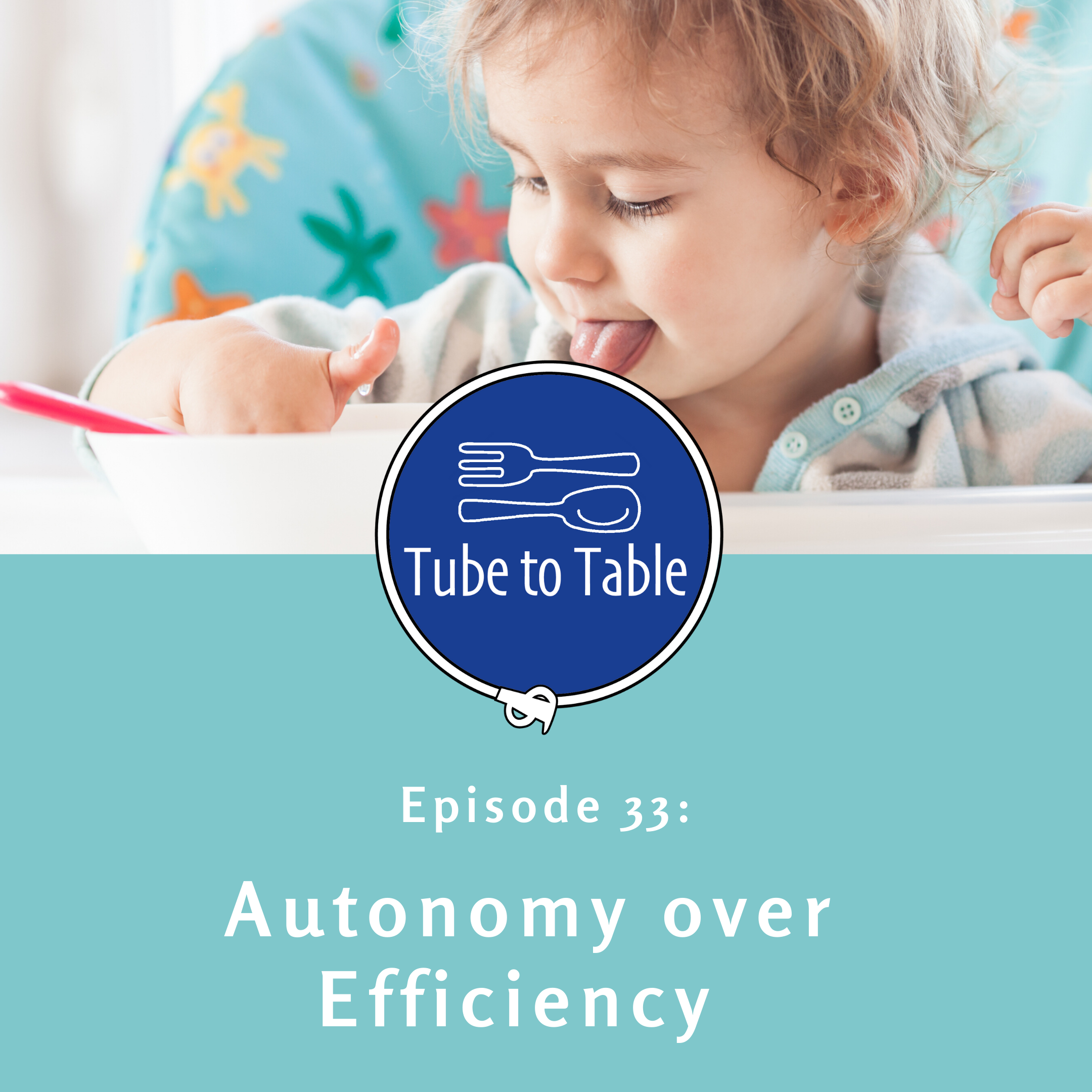Tube to Table Podcast: Episode 33: Autonomy Over Efficiency
March 12, 2020
Posted in: Feeding, Feeding Tube Weaning, Tube To Table Podcast
On this week’s episode of the Tube to Table podcast, Jennifer and Heidi are talking about autonomy. What is it and why is it important in your child’s tube weaning journey? It is so important to allow your child to be autonomous and independent while building a healthy and happy relationship with food. This should be a priority over efficiency and skill development. We have received feedback from therapists and parents who are struggling to find this balance within therapy. Your hosts will elaborate more on what autonomy means, why it is important to prioritize, and how this helps children recover from any past traumatic food experience. So what does this look like in real life at the family table? Jennifer and Heidi will talk through how to build autonomy at mealtimes within your everyday routine, especially throughout the weaning process.
You can download this episode from Itunes, Stitcher, Spotify, Google Play, or listen to it below:
The majority of children we see at Thrive have been through a lot of traumatic experiences. Autonomy plays a large role in helping children helping overcome the side effects of that trauma and build a happy and healthy relationship with food. Developing independence and building autonomy is good for confidence and is an essential part of how children develop. Autonomy is projective of a child’s health when looking at their physical and mental health, as well as safety. Many parents also have had traumatic experiences, watching their child go through any type of medical intervention can be devastating and hard. Even though the tube may have saved your child’s life at some point, the topic can be so upsetting for many families. Because of this, parents often want to skip over a child’s autonomy and quickly go to gaining weight, increasing volume, or weaning off the tube.
What happens when it is too fast?
We start to see this happen when a child starts eating during a wean, but hasn’t yet perfected the skills to be a “great eater”. Parents often think this is because they are just messy or clumsy, so they try to help, instead of allowing the child time to figure it out and improve their efficiency on their own. Although these are often the most well-meaning parents, it can feel scary and less autonomous to the child. Here are a few things you can do in that moment when you can’t help but want to HELP:
- “Sit on your hands” – You don’t have to do literally do this, but it may help! As hard as it may be, hold back from pushing the spoon in their mouth, wiping it off their face and into their mouth, or offering the spoon.
- Be there for your child and support them by loving them and engaging with them in other ways that is not strictly around the food
- Support them when needed and don’t panic. If your child is asking for help, it is of course okay to help them. Your therapist can help you determine what is appropriate help vs. what can be perceived as pushing.
- Prioritize the QUALITY of the initiation and interest over ANY type of skill acquisition or QUANTITY that is going in
The intention to be helpful trumps the ability to read the child’s cues.
The idea that “they’d just like it if they get it in their mouth” or “they must be so frustrated because I’m frustrated” takes over. It is important to shift to take a step back, stop, and watch what your child is actually doing. Your child is likely trying to do it independently and by immediately taking over, they are losing the chance to build autonomy and independence. This can be much easier for a therapist or person aside from the parent to see. Children are likely not frustrated, but they are determined to learn. If you interfere, the attention shifts from experiencing to protection of something fearful.
It is hard for therapists who know the reason why to be patient, but is it especially hard for parents to be able to do this. This is not to say you can’t offer physical help, but make sure that there is an invitation for that help. This can look different for every child, but ask yourself: Do they want me to help or do I want to help them? Finding a way to read their cues and help them be in charge of their own body. Autonomy doesn’t necessarily mean independence, but it means they are in charge of their own body. This means building safety and security to ensure a comfortable place for learning and healing.
When we skip autonomy and go directly for skill development, you are sacrificing responsiveness for efficiency. This will stall progress and has a clear impact on the overall outcome. This is an investment in the outcome and if you can spend time on that, you are helping to build a responsive environment for your child to continue to build autonomy and independence.

Be the first to comment